See other Business/Finance Articles
Title: "Lotto Madness" Sweeps Across America As Powerball Jackpot Hits Record $1.9 Billion
Source:
zerohedge
URL Source: https://www.zerohedge.com/markets/p ... billion-ahead-tonights-drawing
Published: Nov 7, 2022
Author: Tyler Durden
Post Date: 2022-11-07 17:48:30 by Esso
Keywords: None
Views: 7383
Comments: 39
Let's first get out of the way the fact that the lottery is a tax on poor people. Those who can do simple math understand the odds are against them, though it's widely played by low-income Americans hoping to break free from debt and poverty. The lottery preys upon hopes and dreams. With a one in 292 million odds of winning tonight's $1.9 billion Powerball jackpot (yet another record), imagine all the people tapping their resources to play the silly game that most everyone will lose. Advancing Time blog's Bruce Wilds said Americans are being inflicted with "lotto madness" as the Powerball jackpot continues to soar. He said, "for many people a Powerball ticket is a cheap trip down fantasy lane for the poor it is throwing away money they can't afford." The Powerball lottery jackpot continues to grow after no winning tickets were sold for Saturday's drawing of an estimated $1.6 billion. The last winner was on Aug. 3 in Pennsylvania. Tonight's Powerball jackpot drawing, at 10:59 ET, comes after 40 straight drawings without a winner. As the jackpot grows, so do the hopes and dreams of those who think they can strike it rich overnight. The failure of anyone to win America's premier and largest lottery ever has caused the Powerball jackpot to soar creating a phenomenon that could be called "Lotto Madness." The fact this has spread like a fire and swept across America reveals something very significant about our culture. While this might not reach the level of needing a post-event "debriefing" a closer look at how these large lotteries affect our culture may be important and meaningful. How people react to the idea of winning a large sum of money exposes more than a few flaws and insight into our values and the way we think. It seems that society has reached the place where it thinks the road to riches is not through the valley of hard work and savings and that wealth can be achieved without sacrifice. -- Bruce Wilds Suppose there is a winner. The math works out that they can choose between 30 annual payments of $39.9 million after federal taxes or an immediate cash payout of $929 million. Last week, we outlined (read: here) how the next Powerball jackpot winner should go with a lump sum payout due to a souring macroeconomic backdrop with elevated inflation. Quartz pointed out, "the actual cash value of the Powerball jackpot, as a percentage of what Powerball advertises as the jackpot, is lower than it's been in a decade. And that's before adjusting for inflation," Quartz. The current jackpot is the largest in Powerball history, surpassing 2016 one. 1. $1.9 Billion (Est.) - Nov. 7, 2022 2. $1.586 Billion – Jan. 13, 2016 – CA, FL, TN 3. $768.4 Million – Mar. 27, 2019 – WI 4. $758.7 Million – Aug. 23, 2017 – MA 5. $731.1 Million – Jan. 20, 2021 – MD 6. $699.8 Million – Oct. 4, 2021 – CA 7. $687.8 Million – Oct. 27, 2018 – IA, NY 8. $632.6 Million – Jan. 5, 2022 – CA, WI 9. $590.5 Million – May 18, 2013 – FL 10. $587.5 Million – Nov. 28, 2012 – AZ, MO Here are all the Powerball jackpots in the last two decades. The Powerball Jackpot's whopping size spreads like wildfire across all US media outlets. Here's a spike in news stories. Americans are in a frenzy about the largest-ever jackpot. Google search trends are surging about "when is the next Powerball." Bruce Wilds concluded: "During times of massive well-publicized jackpots, people use money that was intended to pay rent and even the food stamp money given to them by taxpayers to buy tickets. Bottom-line this is indeed madness." Just remember, the odds of winning tonight are one in 292 million odds... You have better odds of being struck by lightning. 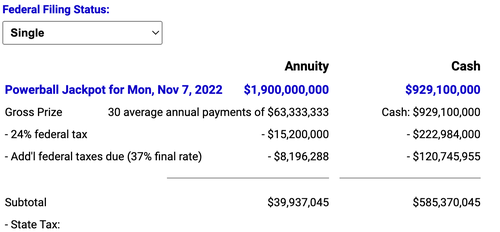
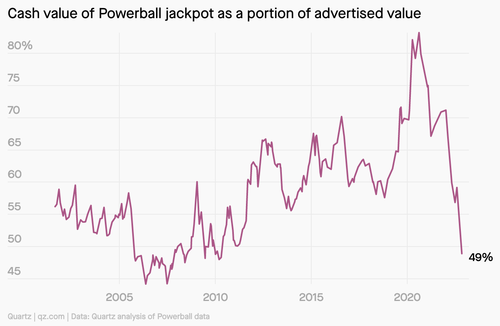
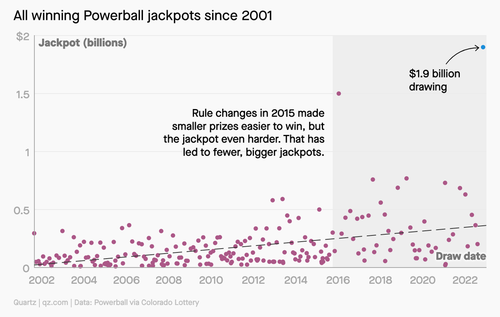
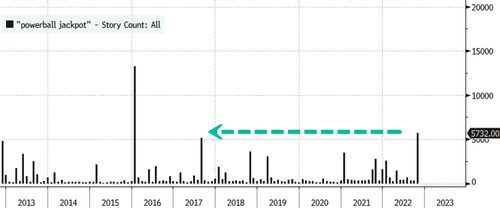
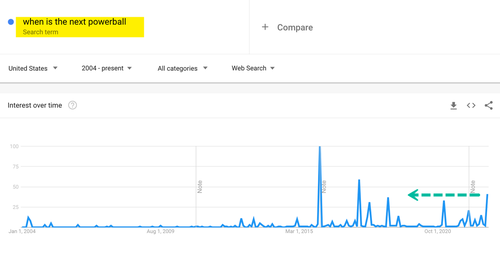
Post Comment Private Reply Ignore Thread
Top • Page Up • Full Thread • Page Down • Bottom/Latest
#1. To: Esso (#0)
Probably better odds of being hit by lightning.... twice.
According to this report, the lawyer of the lady in the South Carolina town near me who won the billion+ dollar lottery in 2018 has been indicted on federal fraud charges. Feds say he and his mafia co-conspirators ripped off $60 million from the lady, and many millions more from other lottery winners: www.greenvilleonline.com/...nner- indicted/5605837002/ BTW, I've been struck by lightning once; it hit the metal roof of my office/lab and jumped from the metal frame of a table to my knee. Didn't really hurt, and didn't even havoc my desktop computer sitting on the same table. Just an arc like that of a hand held stun gun. After that incident I installed an Eaton surge protector and a ground rod.
Whatever state that needs the most influx of cash to pay for their immigrant problems, will likely be the state that it is won in. California, Texas, Florida would be my guess. Anywhere but where I am at. I would not waste money on this, as chances are whoever wins will die almost immediately after. "Call Me Ishmael" -Ishmael, A character from the book "Moby Dick" 1851. "Call Me Fishmeal" -Osama Bin Laden, A character created by the CIA, and the world's Hide And Seek Champion 2001-2011. -Tommythemadartist
The winner of Powerball is not determined by need, they are chosen by how much The Media can glom on to them and create a sensation. J101, Tommy, you know this material! :)
“I am not one of those weak-spirited, sappy Americans who want to be liked by all the people around them. I don’t care if people hate my guts; I assume most of them do. The important question is whether they are in a position to do anything about it. My affections, being concentrated over a few people, are not spread all over Hell in a vile attempt to placate sulky, worthless shits.” - William S Burroughs
To each according to their need. It is built into the communist manifesto. There really aren’t any winners. They are actors getting paid to play a part in a movie. That money probably goes to some black budget office, never to be seen again, to fund the overthrow of some country, or keep some warlord in money. Regardless, it’s all a scam. It isn’t real. "Call Me Ishmael" -Ishmael, A character from the book "Moby Dick" 1851. "Call Me Fishmeal" -Osama Bin Laden, A character created by the CIA, and the world's Hide And Seek Champion 2001-2011. -Tommythemadartist
Funny thing. The power ball was won in Florida, the place hit with a hurricane, that oddly enough needed the money. Imagine me being right. At any rate, it is what it is.
"Call Me Ishmael" -Ishmael, A character from the book "Moby Dick" 1851. "Call Me Fishmeal" -Osama Bin Laden, A character created by the CIA, and the world's Hide And Seek Champion 2001-2011. -Tommythemadartist
No, now they are saying it was in Sacramento California. My local news is so full of shit.
"Call Me Ishmael" -Ishmael, A character from the book "Moby Dick" 1851. "Call Me Fishmeal" -Osama Bin Laden, A character created by the CIA, and the world's Hide And Seek Champion 2001-2011. -Tommythemadartist
The winner was Paul "peter-puffer puss-bag" Pelosi. After all, what us Ultra Mega MAGA America First Republicans put the poor old man through, he deserves it. $2 Billion Winning Powerball Ticket Sold In California LOL, it was not! The winner was one Bupjupian K Azerbjorkian, of the Baltimore branch of Azerbjorkians. “I am not one of those weak-spirited, sappy Americans who want to be liked by all the people around them. I don’t care if people hate my guts; I assume most of them do. The important question is whether they are in a position to do anything about it. My affections, being concentrated over a few people, are not spread all over Hell in a vile attempt to placate sulky, worthless shits.” - William S Burroughs
Murder is always wrong...usually :) “I am not one of those weak-spirited, sappy Americans who want to be liked by all the people around them. I don’t care if people hate my guts; I assume most of them do. The important question is whether they are in a position to do anything about it. My affections, being concentrated over a few people, are not spread all over Hell in a vile attempt to placate sulky, worthless shits.” - William S Burroughs
You understand, don't you, why I chose not to relocate to Waco? :)
“I am not one of those weak-spirited, sappy Americans who want to be liked by all the people around them. I don’t care if people hate my guts; I assume most of them do. The important question is whether they are in a position to do anything about it. My affections, being concentrated over a few people, are not spread all over Hell in a vile attempt to placate sulky, worthless shits.” - William S Burroughs
Waco don't like negroes, dopey! Keep fucking with me, honky! :) How much of your soul outsiders own? “I am not one of those weak-spirited, sappy Americans who want to be liked by all the people around them. I don’t care if people hate my guts; I assume most of them do. The important question is whether they are in a position to do anything about it. My affections, being concentrated over a few people, are not spread all over Hell in a vile attempt to placate sulky, worthless shits.” - William S Burroughs
Money! It's a gas. I'm alright Jack keep your hands off of my stack! “I am not one of those weak-spirited, sappy Americans who want to be liked by all the people around them. I don’t care if people hate my guts; I assume most of them do. The important question is whether they are in a position to do anything about it. My affections, being concentrated over a few people, are not spread all over Hell in a vile attempt to placate sulky, worthless shits.” - William S Burroughs
“I am not one of those weak-spirited, sappy Americans who want to be liked by all the people around them. I don’t care if people hate my guts; I assume most of them do. The important question is whether they are in a position to do anything about it. My affections, being concentrated over a few people, are not spread all over Hell in a vile attempt to placate sulky, worthless shits.” - William S Burroughs
I'm an army of white bitches, bitch. No negroes in my world anymore. Devil spirits, mang, and they shoes just be ugly!
“I am not one of those weak-spirited, sappy Americans who want to be liked by all the people around them. I don’t care if people hate my guts; I assume most of them do. The important question is whether they are in a position to do anything about it. My affections, being concentrated over a few people, are not spread all over Hell in a vile attempt to placate sulky, worthless shits.” - William S Burroughs
I liked negros a lot more pre-bidet... My long hair just can't cover up my genocidal streak. “I am not one of those weak-spirited, sappy Americans who want to be liked by all the people around them. I don’t care if people hate my guts; I assume most of them do. The important question is whether they are in a position to do anything about it. My affections, being concentrated over a few people, are not spread all over Hell in a vile attempt to placate sulky, worthless shits.” - William S Burroughs
I get to see a little baby Saturday for her birthday party. She's gonna be 21. I've got a lot of the goob leaning on me, right this this second...
“I am not one of those weak-spirited, sappy Americans who want to be liked by all the people around them. I don’t care if people hate my guts; I assume most of them do. The important question is whether they are in a position to do anything about it. My affections, being concentrated over a few people, are not spread all over Hell in a vile attempt to placate sulky, worthless shits.” - William S Burroughs
I don't think it's even possible to twerk to that, but I'm sure with enough NGO funding it could be done... “I am not one of those weak-spirited, sappy Americans who want to be liked by all the people around them. I don’t care if people hate my guts; I assume most of them do. The important question is whether they are in a position to do anything about it. My affections, being concentrated over a few people, are not spread all over Hell in a vile attempt to placate sulky, worthless shits.” - William S Burroughs
I always hated that song about cake/rain/MacArthur Park. Jimmy Webb? I think he wrote Wichita Lineman, too. Reminded me of the crap Burt Bacharach was writing...do you know the way to Sante Fe?...or was it San Jose? Doesn't matter...crap music! :)
“I am not one of those weak-spirited, sappy Americans who want to be liked by all the people around them. I don’t care if people hate my guts; I assume most of them do. The important question is whether they are in a position to do anything about it. My affections, being concentrated over a few people, are not spread all over Hell in a vile attempt to placate sulky, worthless shits.” - William S Burroughs
Explain that to your parole officer! :) “I am not one of those weak-spirited, sappy Americans who want to be liked by all the people around them. I don’t care if people hate my guts; I assume most of them do. The important question is whether they are in a position to do anything about it. My affections, being concentrated over a few people, are not spread all over Hell in a vile attempt to placate sulky, worthless shits.” - William S Burroughs
Just come hold me. It's OK now, man. Nobody on 4um can say anything about our non-binary, non-gender love affair. WE'RE FREE BIG NON-GENDER HUMAN WHATEVER! I don't have to explain anything, bitch. And you won't call po-po if I cut off your finger for gene sample? So many people I thought were friends get all pissy about silly shit like that...But seriously, the labs are paying $2.75 a gram. Do your part, help advance genome research.
“I am not one of those weak-spirited, sappy Americans who want to be liked by all the people around them. I don’t care if people hate my guts; I assume most of them do. The important question is whether they are in a position to do anything about it. My affections, being concentrated over a few people, are not spread all over Hell in a vile attempt to placate sulky, worthless shits.” - William S Burroughs
That's beautiful, man... :) “I am not one of those weak-spirited, sappy Americans who want to be liked by all the people around them. I don’t care if people hate my guts; I assume most of them do. The important question is whether they are in a position to do anything about it. My affections, being concentrated over a few people, are not spread all over Hell in a vile attempt to placate sulky, worthless shits.” - William S Burroughs
You're that freak in the cubical next to me, right? I'm the guy that gets banned from marching band for making jokes about Uncle Festerman. “I am not one of those weak-spirited, sappy Americans who want to be liked by all the people around them. I don’t care if people hate my guts; I assume most of them do. The important question is whether they are in a position to do anything about it. My affections, being concentrated over a few people, are not spread all over Hell in a vile attempt to placate sulky, worthless shits.” - William S Burroughs
Don Johnson was a complete rip-off of Graham Bonnet, fashionwise. :) Dude, that chick is hot! “I am not one of those weak-spirited, sappy Americans who want to be liked by all the people around them. I don’t care if people hate my guts; I assume most of them do. The important question is whether they are in a position to do anything about it. My affections, being concentrated over a few people, are not spread all over Hell in a vile attempt to placate sulky, worthless shits.” - William S Burroughs
If his name ended in -ian, he is definitely of Armenian descent. ;) "When bad men combine, the good must associate; else they will fall, one by one." Edmund Burke
You have better odds of being struck by lightning.
#2. To: Pinguinite, Esso (#1)
#3. To: Esso (#0)
#4. To: TommyTheMadArtist (#3)
#5. To: Dakmar (#4)
#6. To: Dakmar (#4)
#7. To: All (#6)
#8. To: TommyTheMadArtist, Dakmar, Lod, 4um. (#7)
(Edited)
No, now they are saying it was in Sacramento California.
www.zerohedge.com/markets...n-jackpot- sold-california
TRUE TERROR will arrive at these people’s door, and they will cry, scream, and beg for mercy…
but it will fall upon the deaf ears of the Men who just wanted to be left alone.”
#9. To: Esso (#8)
(Edited)
The winner was Paul "peter-puffer puss-bag" Pelosi.
#10. To: Esso, TommyTheMadArtist, Lod (#8)
#11. To: Lod (#10)
#12. To: Dakmar, 4um (#11)
You understand, don't you, why I chose not to relocate to Waco?
TRUE TERROR will arrive at these people’s door, and they will cry, scream, and beg for mercy…
but it will fall upon the deaf ears of the Men who just wanted to be left alone.”
#13. To: Esso (#12)
#14. To: TommyTheMadArtist (#7)
(Edited)
No, now they are saying it was in Sacramento California. My local news is so full of shit.
#15. To: Esso (#8)
MEGA-MAGA Counterrevolutionary meeting, apt 29:
#16. To: Dakmar (#13)
Keep fucking with me, honky!
TRUE TERROR will arrive at these people’s door, and they will cry, scream, and beg for mercy…
but it will fall upon the deaf ears of the Men who just wanted to be left alone.”
#17. To: Esso (#16)
#18. To: Dakmar (#17)
TRUE TERROR will arrive at these people’s door, and they will cry, scream, and beg for mercy…
but it will fall upon the deaf ears of the Men who just wanted to be left alone.”
#19. To: Esso (#18)
#20. To: Dakmar (#17)
TRUE TERROR will arrive at these people’s door, and they will cry, scream, and beg for mercy…
but it will fall upon the deaf ears of the Men who just wanted to be left alone.”
#21. To: Esso (#20)
Celebrate all that is precious, my friend.
#22. To: Dakmar (#19)
The Petrograd lineman is definitely OFF the line..
TRUE TERROR will arrive at these people’s door, and they will cry, scream, and beg for mercy…
but it will fall upon the deaf ears of the Men who just wanted to be left alone.”
#23. To: Dakmar (#21)
Here's our song, big boy...
TRUE TERROR will arrive at these people’s door, and they will cry, scream, and beg for mercy…
but it will fall upon the deaf ears of the Men who just wanted to be left alone.”
#24. To: Esso (#21)
#25. To: Esso (#22)
(Edited)
#26. To: Dakmar (#19)
Dak, I love you, here's our song...
TRUE TERROR will arrive at these people’s door, and they will cry, scream, and beg for mercy…
but it will fall upon the deaf ears of the Men who just wanted to be left alone.”
#27. To: Esso (#26)
#28. To: Dakmar (#25)
...do you know the way to Sante Fe?...or was it San Hose? Doesn't matter...crap music!
TRUE TERROR will arrive at these people’s door, and they will cry, scream, and beg for mercy…
but it will fall upon the deaf ears of the Men who just wanted to be left alone.”
#29. To: Dakmar (#27)
Explain that to your parole officer!
TRUE TERROR will arrive at these people’s door, and they will cry, scream, and beg for mercy…
but it will fall upon the deaf ears of the Men who just wanted to be left alone.”
#30. To: Esso (#28)
(Edited)
#31. To: Esso (#28)
Just come hold me. It's OK now, man. Nobody on 4um can say anything about our non-binary, non-gender love affair.
#32. To: Dakmar (#27)
That was cool.
TRUE TERROR will arrive at these people’s door, and they will cry, scream, and beg for mercy…
but it will fall upon the deaf ears of the Men who just wanted to be left alone.”
#33. To: Esso (#32)
You're that freak in the cubical next to me, right?
#34. To: Dakmar, 4um (#32)
Typical date:
TRUE TERROR will arrive at these people’s door, and they will cry, scream, and beg for mercy…
but it will fall upon the deaf ears of the Men who just wanted to be left alone.”
#35. To: Esso (#34)
#36. To: Dakmar (#35)
I want to go home...
TRUE TERROR will arrive at these people’s door, and they will cry, scream, and beg for mercy…
but it will fall upon the deaf ears of the Men who just wanted to be left alone.”
#37. To: Dakmar (#35)
Niggas...
TRUE TERROR will arrive at these people’s door, and they will cry, scream, and beg for mercy…
but it will fall upon the deaf ears of the Men who just wanted to be left alone.”
#38. To: All (#37)
TRUE TERROR will arrive at these people’s door, and they will cry, scream, and beg for mercy…
but it will fall upon the deaf ears of the Men who just wanted to be left alone.”
#39. To: Dakmar (#9)
Azerbjorkian
Top • Page Up • Full Thread • Page Down • Bottom/Latest